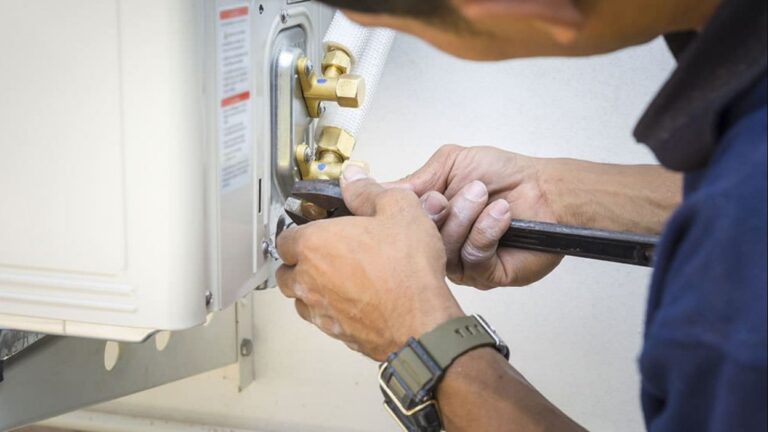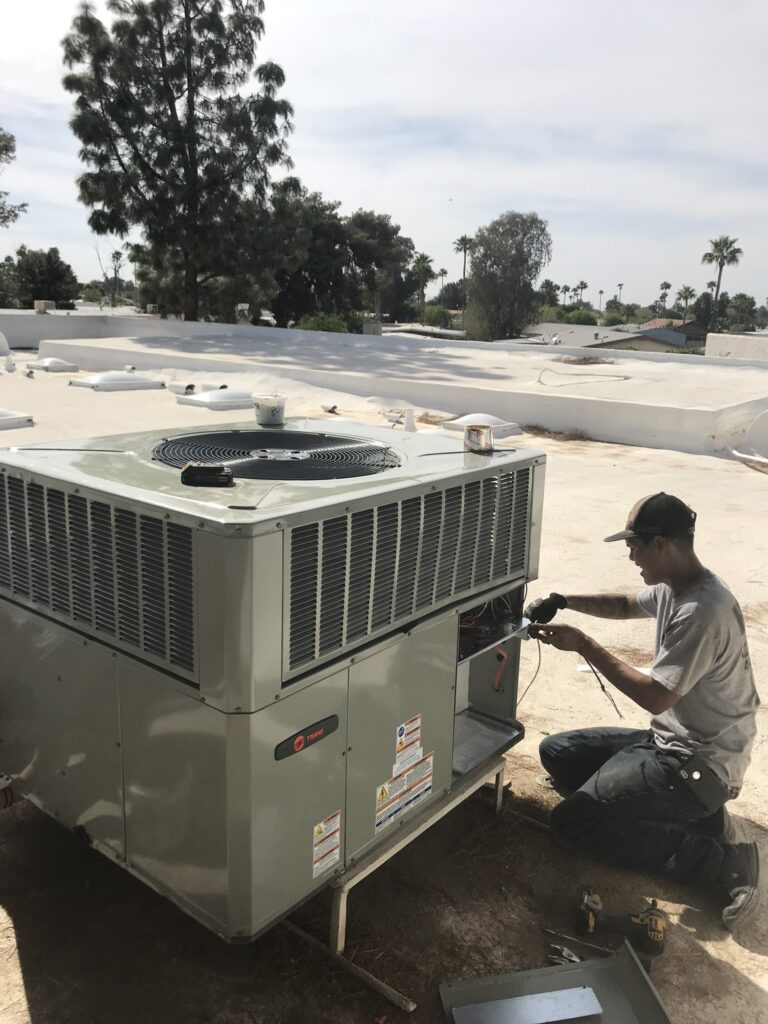How to become an HVAC Technician
If you’re looking for a career that’s in high demand and pays well, you should consider becoming an HVAC technician. With just a few years of training, you can enter this growing field and start earning a good living. Plus, it’s a great way to help people keep their homes and businesses comfortable all year round.
What is HVAC?
HVAC is an acronym that stands for heating, ventilation and air conditioning. HVAC technicians are the professionals who install, maintain and repair residential and commercial HVAC systems. Becoming an HVAC technician requires completing a training program and passing an industry-recognized certification exam.
The heating portion of an HVAC system keeps a space warm during cold weather months. A furnace or heat pump circulates warm air throughout the house or building via ductwork. The ventilation part of HVAC controls the exchange of indoor and outdoor air to keep the space comfortable and free of contaminants. This is done with fans, vents and exhaust systems. The air conditioning portion cools indoor air during hot weather months. An air conditioner or cooling system removes heat from the air, lowering the temperature inside the space.
Most HVAC systems include all three components — heating, ventilation and cooling — although some only include two. For example, a “split” system only has an indoor unit and an outdoor unit. The outdoor unit is usually located on the ground or rooftop and contains the condenser, compressor and fan. The indoor unit contains the evaporator coil and blower fan. “Package” units are similar to split systems but both the indoor and outdoor units are combined into one cabinet. These are typically used in commercial applications such as hotels, offices and schools.
What are the requirements to become an HVAC technician?
Education: A high school diploma or GED is required to become an HVAC technician. Many technicians also receive postsecondary education from technical schools or community colleges that offer programs in HVAC technology. Certification: Many states and localities require HVAC technicians to be licensed. Some states have licensing requirements for all HVAC contractors, while others only require licenses for those who work with refrigerants. To find out the requirements in your area, contact your local or state consumer affairs office or licensing board. Although not required, certification from a professional organization such as the Refrigeration Service Engineers Society (RSES) can show employers that you are qualified and have up-to-date training. Work Experience: Some entry-level jobs may be available to those with no previous experience, but most HVAC technicians have had at least some on-the-job training before becoming certified. Many technicians start out as helpers or apprentices and then receive more training through an apprenticeship or on-the-job training program. Some states have formal apprenticeship programs that combine on-the-job training with classroom instruction, while other workers learn through informal on-the-job training arranged by their employer.
What are the skills needed to be an HVAC technician?
HVAC technicians install, maintain, and repair heating, ventilation, and cooling systems. They work with a variety of tools and instruments to troubleshoot problems and ensure that systems are working properly. To be an HVAC technician, you need to have strong problem-solving skills and be able to read and interpret technical manuals. You also need to be familiar with basic electricity and have good mechanical skills.
What are the duties of an HVAC technician?
An HVAC technician installs, maintains, and repairs heating, ventilation, and air conditioning systems.
HVAC technicians typically do the following:
-Inspect homes or commercial buildings to determine the need for HVAC repairs or installation
-Clean and maintain HVAC systems to keep them working efficiently and to prevent breakdowns
-Install ductwork in homes or commercial buildings
-Install and maintain gas furnaces, heat pumps, and central air conditioners
-Install and maintain electric furnaces, heat pumps, and central air conditioners
-Repair electrical wiring on HVAC equipment
-Repair gas leaks on furnaces or boilers
What are the benefits of being an HVAC technician?
You may be wondering, why become an HVAC technician? After all, it’s a demanding career that requires extensive training and on-the-job experience. But the rewards of being an HVAC technician are many. First and foremost, HVAC technicians enjoy good job security. The Bureau of Labor and Statistics projects that employment of heating, air conditioning and refrigeration mechanics and installers will grow 14 percent from 2016 to 2026 — much faster than the average for all occupations.
What are the challenges of being an HVAC technician?
Working as an HVAC technician can be both challenging and rewarding. As a technician, you will be responsible for installing, repairing, and maintaining heating, ventilation, and air conditioning systems. You will need to be able to troubleshoot problems and have a keen understanding of how the systems work in order to effectively perform your job.
While the challenges of being an HVAC technician can be numerous, they are also what make the job so rewarding. Helping people to stay comfortable in their homes and businesses is a noble profession, and one that comes with great responsibility. If you are up for the challenges of being an HVAC technician, then there is no doubt that you will find the rewards to be well worth it.
How to get started as an HVAC technician?
There’s no one-size-fits-all answer to this question, as the best way to become an HVAC technician may vary depending on your qualifications and experience. However, there are a few general tips that can help you get started in this career:
1.Research the requirements for becoming an HVAC technician in your state or country. In most cases, you will need to complete a vocational program or apprenticeship before you can be licensed to work as an HVAC technician.
2.Complete an accredited training program. This will give you the skills and knowledge you need to work as an HVAC technician. Make sure to choose a program that is recognized by your state or country’s licensing board.
3.Earn your HVAC license. Once you have completed your training, you will need to pass an exam in order to earn your HVAC license. Each state has different requirements for licensing, so be sure to check with your local licensing board for information on how to apply for a license in your area.
4.Get experience working with HVAC systems. While it is not always required, having some experience working with HVAC systems can be helpful when you are starting out as an HVAC technician. You may want to consider volunteering or working part-time at an HVAC company in order to gain some hands-on experience.
What are the career options for HVAC technicians?
The most common career option for those with HVAC training is to become an HVAC technician. However, there are other career options available for those with HVAC training. Some of these other options include:
-Commercial refrigeration technician
-HVAC installer
-HVAC salesperson
-HVAC engineer
-HVAC project manager
What are the salary prospects for HVAC technicians?
In 2017, HVAC technicians made a median salary of $47,610. The best-paid 25 percent made $62,430 that year, while the lowest-paid 25 percent made $36,640.
As of May 2018, the median annual salary for HVAC technicians was $50,320, with the top 10 percent earning more than $76,930 and the bottom 10 percent earning less than $33,430.
How to become an HVAC technician?
There is no one way to become an HVAC technician. Some people enter the field with a formal education from a trade school, while others learn through on-the-job training. No matter what path you take, you’ll need to have good technical and mechanical skills, as well as the ability to troubleshoot and repair complex equipment.
The best way to learn how to become an HVAC technician is to start by working in the field. Many companies are willing to train entry-level employees, so this is a great way to get your foot in the door. You can also look into attending a trade school or community college that offers HVAC training programs. These programs typically last for several months and can give you the skills and knowledge you need to start your career.




